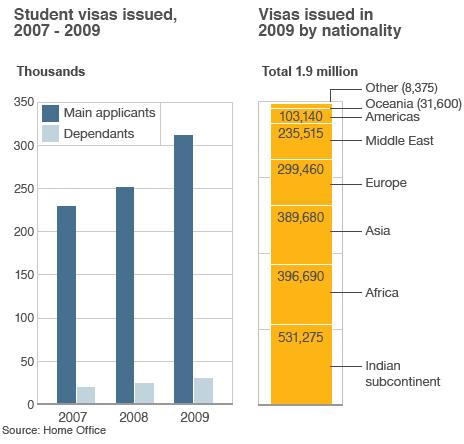Net migration to UK rose in 2009, statistics show
- Published
Immigration minister Damian Green: "Hidden in these figures are two very big increases"
Net migration to the UK rose last year to 196,000, up by 33,000 from the number in 2008.
Office for National Statistics figures show 4% fewer people arrived in the UK last year - 567,000 compared with 590,000 in 2008 - but the number who left fell further, by 13% to 371,000.
Home Office data shows a 37% rise in people granted settlement in the UK between June 2009 and June 2010.
The number of visas issued to students also went up by 35% to 362,015.
Left-leaning think tank the Institute for Public Policy Research said the fall in long-term emigration to 371,000 last year, from 427,000 in 2008, was largely due to fewer British people moving overseas.
Among those classed as immigrants to the UK in 2009, many were actually Britons returning from overseas, it added.
Student visas
The BBC's Andy Tighe said the increase in student visas revealed by the Home Office's annual bulletin, external was significant, and there was some concern within the government about how easy it appeared to be for people to move to the UK with their families on study-related permits.
Our home affairs correspondent said the figures also showed a significant fall in the number of work-related visas issued, in part due to the recession and also because of the points-based system for those wishing to come to the UK from outside Europe.
Immigration minister Damian Green said the figures were proof that the coalition government had inherited an immigration system that was "largely out of control".
"What these figures tell me is that we also need to look at all the other routes [aside from employment] by which people come into this country, maybe for education, for family reunion reasons and also, in particular, routes that lead to permanent settlement."

On the issue of those given permission to come here to study, Mr Green said: "It's important to look carefully at those courses to see that they are genuinely valuable and are not just being used as an excuse to evade immigration controls."
Shadow home secretary Alan Johnson said the increase in people entering the country through an academic route showed the previous Labour government was correct to tighten the rules.
"The government's recently announced 'cap' will affect less than a third of 1% of those coming to our shores," he said.
"The points-based system works and the government is foolish to pretend they can improve its effectiveness with an arbitrary cap."
Alp Mehmet, from campaign group Migrationwatch UK, said too many institutions were able to issue letters of acceptance which allowed people from overseas to gain enough points to qualify for a student visa.
But the Chartered Institute of Personnel and Development said the sharp fall in the number of work-related visas showed the points-based system was "robust and working".
A further cap on net immigration - planned by the government - would leave many employers with a significant skills gap, it added.
Asylum figures
Also released on Thursday were the latest available figures for 2010 detailing population movements in the second quarter of the year.
In this period, the number of applications to the UK for asylum, excluding dependants, was 29% down on the same quarter in 2009. Two-thirds of this fall was due to a drop in applications from Zimbabwe, from 1,560 to 405.
In 2009 as a whole, asylum applications, excluding dependants, dropped 6% from 2008 levels.
In the second quarter of this year, the Home Office said 14,130 people were removed from the UK or left voluntarily, 14% fewer than the same quarter in 2009 when the figure was 16,345.
Refugee Council chief executive Donna Covey highlighted other statistics that caused her concern. She said: "These figures show that almost a third of appeals are still being allowed, proving a significant proportion of initial asylum claims are being wrongly refused.
"The detention figures are also cause for alarm - up to 40% of people detained were later released back into their community, showing that detaining them was unnecessary in the first place."
Other details from the statistics included:
Of those granted settlement in the UK in 2009, 68% were dependants of those already living in the country
Migrants from the Indian sub-continent made up to largest proportion of settlement grants, 34%. Of the remainder 25% were from Africa and 21% from elsewhere in Asia
The total number of approved applications from EU citizens to come and work in the UK fell 22% to 118,675 from 151,870 in 2008
The number of Polish migrants approved to work in the UK in 2009 fell 38% to 62,095, from 100,500 in 2008
But the number from Latvia and Lithuania increased considerably - the former from 6,005 to 16,020, and the latter from 10,550 to 15,815
Nearly a quarter of all births, 24.6%, in 2009 were to mothers born outside the UK
In the London borough of Newham, which has the highest number of births to foreign-born mothers in the country, the figure was 75.7%
- Published14 April 2011
- Published27 May 2010